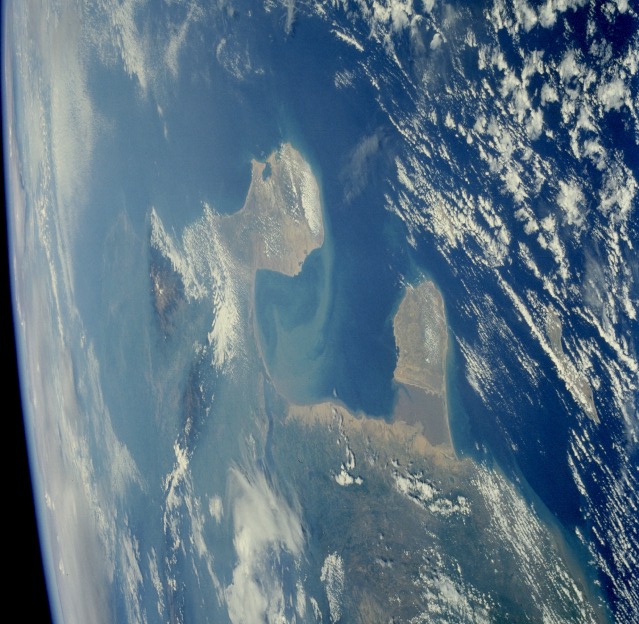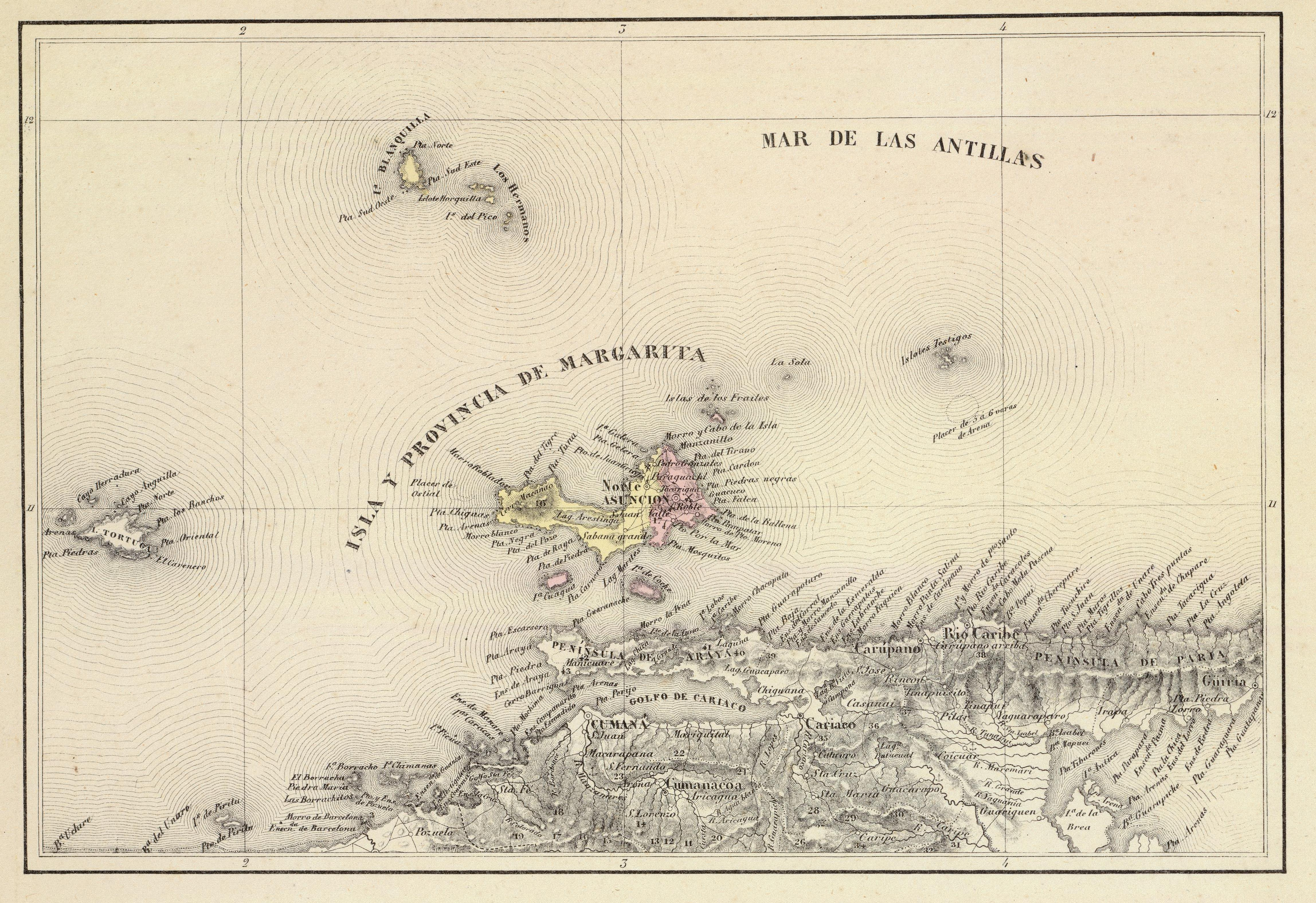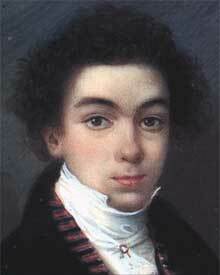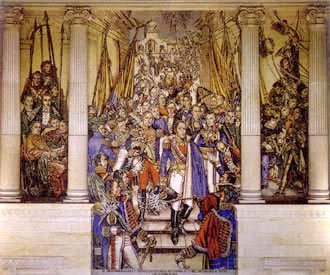|
Colonial Venezuela
Spanish expeditions led by Columbus and Alonso de Ojeda reached the coast of present-day Venezuela in 1498 and 1499. The first colonial exploitation was of the pearl oysters of the "Pearl Islands". Spain established its first permanent South American settlement in the present-day city of Cumaná in 1502, and in 1577 Caracas became the capital of the Province of Venezuela. There was also for a few years a German colony at Klein-Venedig. The 16th- and 17th-century colonial economy was centered on gold mining and livestock farming. The relatively small number of colonists employed indigenous farmers on their '' haciendas'', and enslaved other indigenous people and, later, Africans to work in the mines. The Venezuelan territories were governed at different times from the distant capitals of the Viceroyalties of New Spain and Peru. In the 18th century, cocoa plantations grew up along the coast, worked by further importations of African slaves. Cacao beans became Venezuela's principal ... [...More Info...] [...Related Items...] OR: [Wikipedia] [Google] [Baidu] |
Christopher Columbus
Christopher Columbus * lij, Cristoffa C(or)ombo * es, link=no, Cristóbal Colón * pt, Cristóvão Colombo * ca, Cristòfor (or ) * la, Christophorus Columbus. (; born between 25 August and 31 October 1451, died 20 May 1506) was an Italian explorer and navigator who completed Voyages of Christopher Columbus, four voyages across the Atlantic Ocean sponsored by the Catholic Monarchs of Spain, opening the way for the widespread European Age of Discovery, exploration and colonization of the Americas. His expeditions were the first known European contact with the Caribbean, Central America, and South America. The name ''Christopher Columbus'' is the anglicisation of the Latin . Scholars generally agree that Columbus was born in the Republic of Genoa and spoke a dialect of Ligurian (Romance language), Ligurian as his first language. He went to sea at a young age and travelled widely, as far north as the British Isles and as far south as what is now Ghana. He married Port ... [...More Info...] [...Related Items...] OR: [Wikipedia] [Google] [Baidu] |
Guipuzcoana Company
The Royal Guipuzcoan Company of Caracas (modern spelling variant ''Gipuzkoan'', known also as the ''Guipuzcoana Company'', es, Real Compañia Guipuzcoana de Caracas; eu, Caracasko Gipuzkoar Errege Konpainia) was a Spanish Basque trading company in the 18th century, operating from 1728 to 1785, which had a monopoly on Venezuelan trade. It was renamed in 1785 to the Royal Company of the Philippines, Royal Philippine Company ( es, Real Compañia de Filipinas). History Foundation The company was founded by a group of wealthy Basques from the province of Gipuzkoa in 1728. The specific aim of the Basque company, acting almost autonomously with tasks of military nature at their own command and expense, was to break the ''de facto'' Dutch West India Company, Dutch monopoly on the cocoa trade in the Captaincy General of Venezuela. It was initially based in San Sebastián and received its Decree, royal decree on September 25, 1728, by Philip V of Spain.Kurlansky, M. ''A Basque Hist ... [...More Info...] [...Related Items...] OR: [Wikipedia] [Google] [Baidu] |
Venice
Venice ( ; it, Venezia ; vec, Venesia or ) is a city in northeastern Italy and the capital of the Veneto Regions of Italy, region. It is built on a group of 118 small islands that are separated by canals and linked by over 400 bridges. The islands are in the shallow Venetian Lagoon, an enclosed bay lying between the mouths of the Po River, Po and the Piave River, Piave rivers (more exactly between the Brenta (river), Brenta and the Sile (river), Sile). In 2020, around 258,685 people resided in greater Venice or the ''Comune di Venezia'', of whom around 55,000 live in the historical island city of Venice (''centro storico'') and the rest on the mainland (''terraferma''). Together with the cities of Padua, Italy, Padua and Treviso, Italy, Treviso, Venice is included in the Padua-Treviso-Venice Metropolitan Area (PATREVE), which is considered a statistical metropolitan area, with a total population of 2.6 million. The name is derived from the ancient Adri ... [...More Info...] [...Related Items...] OR: [Wikipedia] [Google] [Baidu] |
Gulf Of Venezuela
The Gulf of Venezuela is a gulf of the Caribbean Sea bounded by the Venezuelan states of Zulia and Falcón and by La Guajira Department, Colombia. The western side is formed by the Guajira Peninsula. A strait connects it with Maracaibo Lake to the south. Location The Gulf is located in the north of South America, between Paraguaná Peninsula of the Falcón State to the east in Venezuela and Guajira Peninsula in Colombia to the west. It is connected to the south to Maracaibo Lake through an artificial navigation canal. Colombia and Venezuela have had a longstanding dispute over control of the gulf that has not been resolved, despite the decades-long negotiations conducted by a bilateral commission. History The gulf was first seen by Europeans in 1499, when an expedition commanded by Alonso de Ojeda, in which he was accompanied by Amerigo Vespucci, explored the Venezuelan coasts. They compiled information and named the new lands; this expedition arrived at the gulf after passi ... [...More Info...] [...Related Items...] OR: [Wikipedia] [Google] [Baidu] |
Isla Margarita
Margarita Island (, ) is the largest island in the Venezuelan state of Nueva Esparta, situated off the northeastern coast of the country, in the Caribbean Sea. The capital city of Nueva Esparta, La Asunción, is located on the island. History Age of Exploration Christopher Columbus was the first European to arrive on Margarita Island in 1498. The local natives were the Guaiqueries people. The coast of the island was abundant in pearls, which represented almost a third of all New World tribute to the Spanish Crown. Margarita Island was fortified against the increasing threat of pirate attacks, and some fortifications remain today. It was the center of Spanish colonial Margarita Province, established in 1525. In 1561, the island was seized by Lope de Aguirre, a notoriously violent and rebellious conquistador. Around 1675, the island was captured again, this time by Red Legs Greaves, a pirate known for his humanity and morality. He captured a fleet of Spanish ships off por ... [...More Info...] [...Related Items...] OR: [Wikipedia] [Google] [Baidu] |
Cubagua
Cubagua Island or Isla de Cubagua () is the smallest and least populated of the three islands constituting the Venezuelan state of Nueva Esparta, after Margarita Island and Coche Island. It is located north of the Araya Peninsula, the closest mainland area. Geography Topography The island is in size, an elliptical shape with the longer axis east-west. Its area is . The coast consists of some beaches as well as cliffs from high in the south and from high in the north. The highest elevation of the flat-topped island reaches . Climate It is dry and lacks surface water bodies (the only freshwater is found in small underground reservoirs). Annual precipitation is , which is the value of a dry desert. Temperatures are close to year-round with little fluctuation. Vegetation The desert-like (xerophytic) vegetation of the essentially barren island includes a number of cactus species such as Cardón de Dato ('' Ritterocereus griseus''), Buche, Melón de Cerro, Sabana o Monte (''Mel ... [...More Info...] [...Related Items...] OR: [Wikipedia] [Google] [Baidu] |
Voyages Of Christopher Columbus
Between 1492 and 1504, Italian explorer Christopher Columbus led four Spanish transatlantic maritime expeditions of discovery to the Americas. These voyages led to the widespread knowledge of the New World. This breakthrough inaugurated the period known as the Age of Discovery, which saw the colonization of the Americas, a related biological exchange, and trans-Atlantic trade. These events, the effects and consequences of which persist to the present, are often cited as the beginning of the modern era. Born in the Republic of Genoa, Columbus was a navigator who sailed for the Crown of Castile (a predecessor to the modern Kingdom of Spain) in search of a westward route to the Indies, thought to be the East Asian source of spices and other precious oriental goods obtainable only through arduous overland routes. Columbus was partly inspired by 13th-century Italian explorer Marco Polo in his ambition to explore Asia and never admitted his failure in this, incessantly claiming an ... [...More Info...] [...Related Items...] OR: [Wikipedia] [Google] [Baidu] |
Simón Bolívar
Simón José Antonio de la Santísima Trinidad Bolívar y Palacios (24 July 1783 – 17 December 1830) was a Venezuelan military and political leader who led what are currently the countries of Colombia, Venezuela, Ecuador, Peru, Panama and Bolivia to independence from the Spanish Empire. He is known colloquially as '' El Libertador'', or the ''Liberator of America''. Simón Bolívar was born in Caracas in the Captaincy General of Venezuela into a wealthy criollo family. Before he turned ten, he lost both parents and lived in several households. Bolívar was educated abroad and lived in Spain, as was common for men of upper-class families in his day. While living in Madrid from 1800 to 1802, he was introduced to Enlightenment philosophy and met his future wife María Teresa Rodríguez del Toro y Alaysa. After returning to Venezuela, in 1803 del Toro contracted yellow fever and died. From 1803 to 1805, Bolívar embarked on a grand tour that ended in Rome, where he swore to end ... [...More Info...] [...Related Items...] OR: [Wikipedia] [Google] [Baidu] |
Gran Colombia
Gran Colombia (, "Great Colombia"), or Greater Colombia, officially the Republic of Colombia (Spanish: ''República de Colombia''), was a state that encompassed much of northern South America and part of southern Central America from 1819 to 1831. It included present-day Colombia, mainland Ecuador (i.e. excluding the Galápagos Islands), Panama, and Venezuela, along with parts of northern Peru, northwestern Brazil, and Part of Guyana. The terms Gran Colombia and Greater Colombia are used historiographically to distinguish it from the current Republic of Colombia, which is also the official name of the former state. However, international recognition of the legitimacy of the Gran Colombian state ran afoul of European opposition to the independence of states in the Americas. Austria, France, and Russia only recognized independence in the Americas if the new states accepted monarchs from European dynasties. In addition, Colombia and the international powers disagreed over the exte ... [...More Info...] [...Related Items...] OR: [Wikipedia] [Google] [Baidu] |
Venezuelan War Of Independence
The Venezuelan War of Independence ( es, Guerra de Independencia de Venezuela, links=no, 1810–1823) was one of the Spanish American wars of independence of the early nineteenth century, when independence movements in Latin America fought against rule by the Spanish Empire, emboldened by Spain's troubles in the Napoleonic Wars. The establishment of the Supreme Caracas Junta following the forced deposition of Vicente Emparan as Captain General of the Captaincy General of Venezuela on 19 April 1810, marked the beginnings of the war. On 5 July 1811, seven of the ten provinces of the Captaincy General of Venezuela declared their independence in the Venezuelan Declaration of Independence. The First Republic of Venezuela was lost in 1812 following the 1812 Caracas earthquake and the 1812 Battle of La Victoria. Simón Bolívar led an "Admirable Campaign" to retake Venezuela, establishing the Second Republic of Venezuela in 1813; but this too did not last, falling to a combination ... [...More Info...] [...Related Items...] OR: [Wikipedia] [Google] [Baidu] |
Peninsular War
The Peninsular War (1807–1814) was the military conflict fought in the Iberian Peninsula by Spain, Portugal, and the United Kingdom against the invading and occupying forces of the First French Empire during the Napoleonic Wars. In Spain, it is considered to overlap with the Spanish War of Independence. The war started when the French and Spanish armies invaded and occupied Portugal in 1807 by transiting through Spain, and it escalated in 1808 after Napoleonic France occupied Spain, which had been its ally. Napoleon Bonaparte forced the abdications of Ferdinand VII and his father Charles IV and then installed his brother Joseph Bonaparte on the Spanish throne and promulgated the Bayonne Constitution. Most Spaniards rejected French rule and fought a bloody war to oust them. The war on the peninsula lasted until the Sixth Coalition defeated Napoleon in 1814, and is regarded as one of the first wars of national liberation. It is also significant for the emergence of larg ... [...More Info...] [...Related Items...] OR: [Wikipedia] [Google] [Baidu] |
Captaincy General Of Venezuela
The Captaincy General of Venezuela ( es, Capitanía General de Venezuela), also known as the Kingdom of Venezuela (), was an administrative district of colonial Spain, created on September 8, 1777, through the Royal Decree of Graces of 1777, to provide more autonomy for the provinces of Venezuela, previously under the jurisdiction of the Audiencia of Santo Domingo (and thus the Viceroyalty of New Spain) and then the Viceroyalty of New Granada. It established a unified government in political (governorship), military ( captaincy general), fiscal ( intendancy), ecclesiastical (archdiocese) and judicial ('' audiencia'') affairs. Its creation was part of the Bourbon Reforms and laid the groundwork for the future nation of Venezuela, in particular by orienting the province of Maracaibo towards the province of Caracas. History Antecedents The Bourbon dynasty had already taken steps towards reorganizing their overseas possessions and Venezuela, in particular. When the New Granadan ... [...More Info...] [...Related Items...] OR: [Wikipedia] [Google] [Baidu] |



.jpg)


.jpg)

